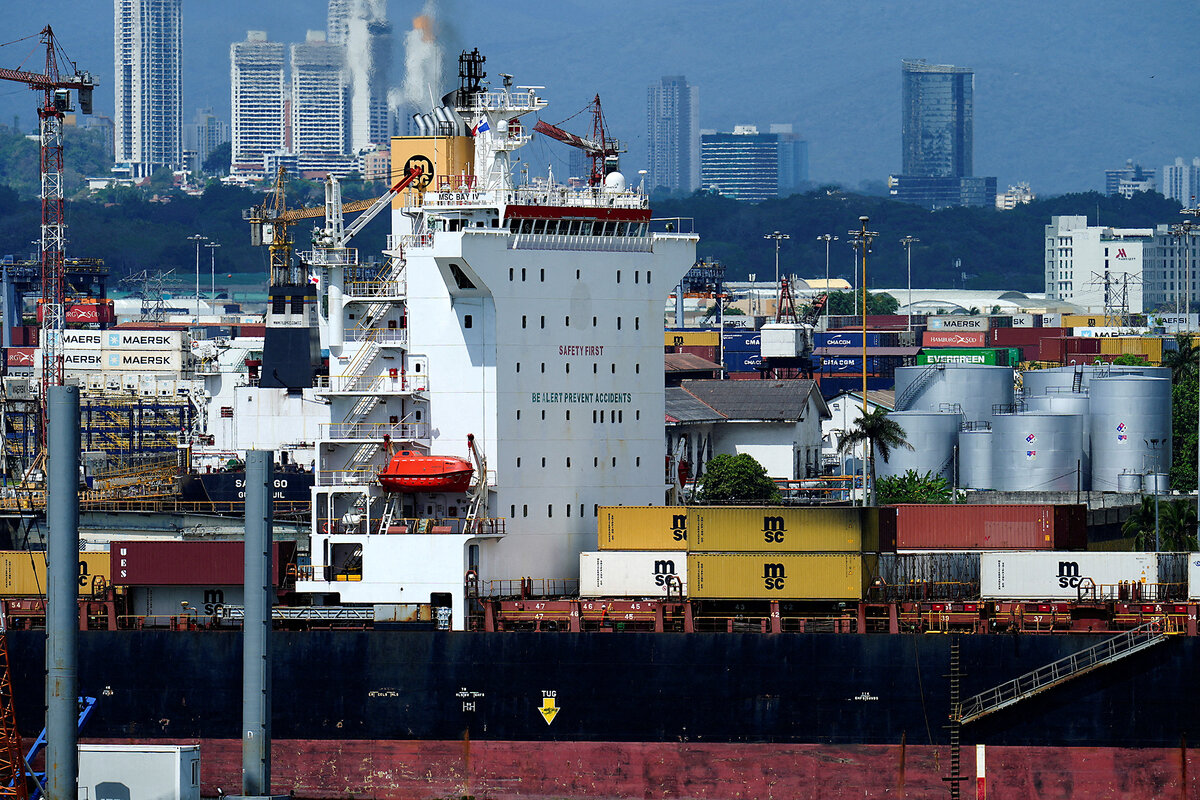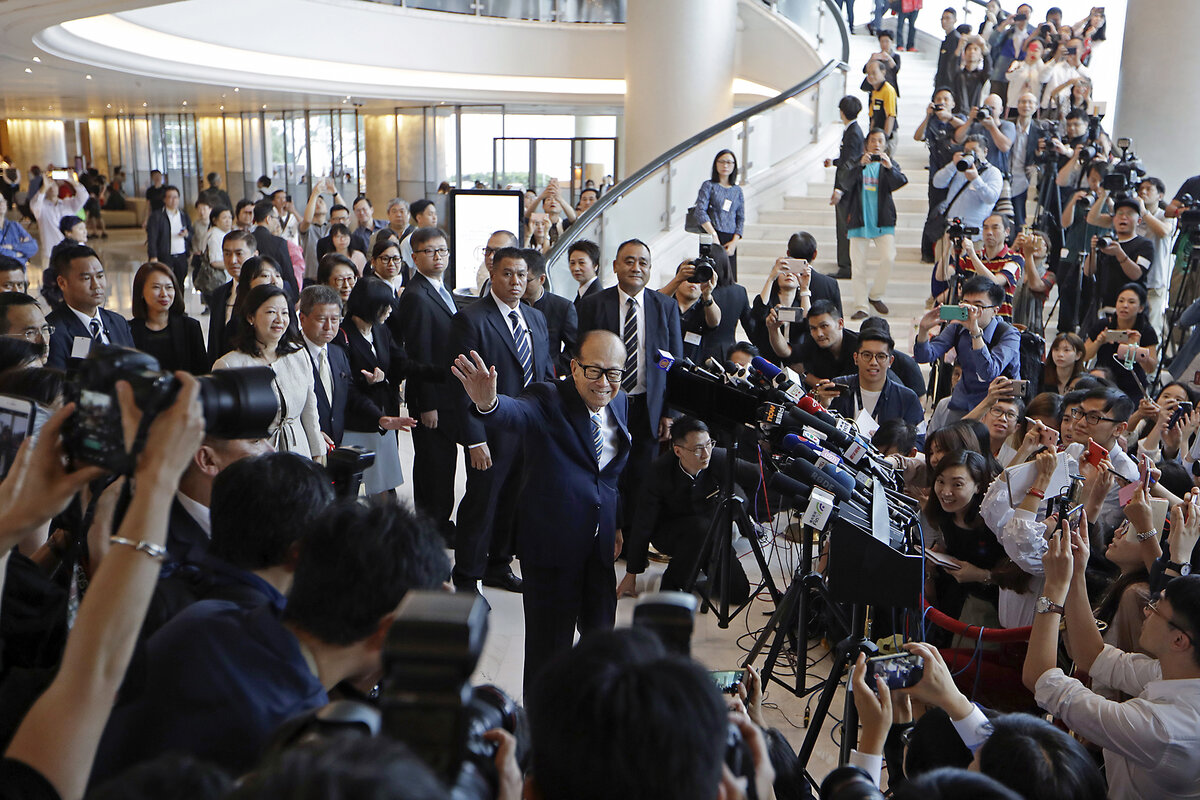How a 43-port business deal threatens China’s global power
Loading...
| Beijing
In Washington, the planned sale of Panama Canal ports to an American-led group is largely cast as a sign of expanding U.S. influence in Central America. But in China, it is seen as a prime battleground in the U.S.-China rivalry.
Beijing is lobbying hard against the giant port deal, under which a Hong Kong-based firm would sell its interest in 43 ports worldwide to a U.S.-led international consortium.
Beijing’s top anti-monopoly regulator said Friday it would review the sale by CK Hutchison Holdings Ltd., which is pessimistic about port operations’ profitability and keen to hold more cash.
Why We Wrote This
How far is China willing to go to protect its geopolitical interests overseas? As a Hong Kong company prepares to sell 43 ports to a U.S.-led group, Beijing has launched a campaign to modify – or ideally stop – the deal.
If the deal goes through, it would cut Chinese-owned port operations globally by nearly half, transferring strategic assets to an international consortium led by the American asset manager BlackRock Inc.
For China, the world’s top trading power, this would mark a significant loss of geopolitical leverage. Over the past two decades, Chinese firms have taken stakes in 95 ports worldwide, which both facilitate Chinese trade and service China’s rapidly expanding navy.
Beijing’s effort to exert political pressure marks a major test of its extraterritorial influence over commercial transactions, and of the independence of Chinese firms based in Hong Kong. With the approach of an April 2 target for signing the deal, Beijing has heightened the stakes, amplifying criticism that casts the deal as a historic mistake that would empower the United States and hamper China’s global development.
“It’s just a massive restructuring of the big companies in shipping,” says John Frederick Bradford, adjunct senior fellow in the Maritime Security Programme at the S. Rajaratnam School of International Studies (RSIS) of Nanyang Technological University in Singapore.
“This network … is a tremendous economic and commercial advantage for the larger Chinese effort, so if it swaps, they are losing that advantage,” says Mr. Bradford. “You will see an American-backed company controlling a huge number of [international terminals],” he says, in contrast with virtually none today.
Backlash over “national security”
When the two companies announced the $22.8 billion deal in early March, they insisted it was “purely commercial” and would be finalized before April 2. But the geopolitical fallout has been swift, and the deal is now expected to be delayed.
President Donald Trump has praised the agreement, which would transfer two ports on either end of the Panama Canal to the U.S. consortium, suggesting it shows that the United States is “taking … back” the canal from China. In fact, Panama will retain sovereignty over the canal.
Angered that China was blindsided by the announcement – and has potentially lost a bargaining chip in future talks between Mr. Trump and Chinese leader Xi Jinping – Beijing launched a campaign to modify the deal.
China’s Communist Party authorities have slammed it as a threat to national security.
“Once the 43 ports and terminals … fall into the hands of the U.S. consortium, it is equivalent to falling into the hands of the U.S. authorities,” the Communist Party’s Hong Kong newspaper Ta Kung Pao warned. “China’s shipbuilding, shipping, international trade, and even the development of the ‘Belt and Road’ will face serious blows,” it added, referring to China’s trillion-dollar global infrastructure initiative.
Linking the deal to national security alarms Hong Kong’s business community, experts say.
“There’s speculation whether China or Hong Kong would invoke the national security law to block the deal” says Wang Xiangwei, an associate professor of journalism at Hong Kong Baptist University. “That’s the nuclear option – if China does that, it could destroy business confidence in Hong Kong.”
Hong Kong tensions
A former British colony that reverted to Chinese rule in 1997, Hong Kong has long enjoyed a reputation as a capitalist entrepôt where companies operate relatively free from regulation. But China has moved aggressively in the past five years to curtail Hong Kong’s autonomy, undermining its judicial independence and imposing a draconian national security law. The crackdown has coincided with a decline in the number of foreign firms placing their regional headquarters in Hong Kong.
China’s opposition to the CK Hutchison deal has highlighted the tension between Beijing’s insistence that private companies should prioritize national interests, and companies’ desire to act in their commercial best interests.
“Great entrepreneurs have never been cold-blooded speculative profit-seekers, but enthusiastic and proud patriots!” said a March 15 article in Ta Kung Pao, reposted by Chinese officials. “In the face of the U.S.’s powerful bullying, only by standing firmly with the country and fighting bravely can they defend their country.”
Such strong language, reminiscent of radical Maoist rhetoric during the 1966-76 Cultural Revolution, is also undermining Beijing’s recent efforts to woo private entrepreneurs and foreign investors to stimulate the nation’s slowing economy.
Beijing is likely holding private conversations with family members of Li Ka-shing, the Hong Kong billionaire and philanthropist who is ranked as the city’s wealthiest person. Mr. Li is currently senior advisor to CK Hutchison, and his son, Victor Li, is chairman of the board.
In recent years, Mr. Li and his family have diversified company assets away from mainland China and shifted investments to Europe and elsewhere. Mr. Li’s once-close relations with China’s leaders have cooled under Mr. Xi.
“How the Chinese government weighed in was a bit too much – accusing the Li family of being unpatriotic and selling out the Chinese people. It’s a private business, you can’t expect them to be politically correct in everything they do,” says Mr. Wang.
“The Li family is not a state-owned enterprise, and Hong Kong is a place known for its freewheeling capitalism and minimal regulatory oversight,” he adds. “They have been doing this for the last 100 years.”








